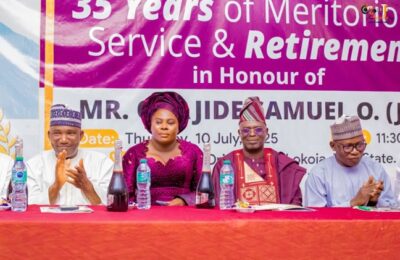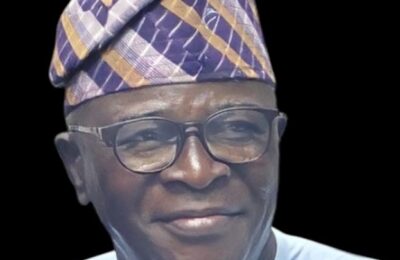In Nigeria, political defections have become an almost routine spectacle, undermining the very fabric of democratic integrity. While defections are not unique to any political system, in Nigeria, they have taken on a particularly troubling dimension, often driven by personal ambition rather than ideological conviction. This raises the question: should such behavior be regarded as political harlotry, a betrayal of public trust in exchange for personal gain?
In the United States, party defections are rare and typically occur after significant ideological shifts or deeply held personal convictions. For example, figures like Ronald Reagan, who transitioned from the Democratic Party to the Republican Party, or Jim Jeffords, who defected from the Republicans to become an Independent, did so based on a realignment of values. These defections were not motivated by opportunism but by a belief that the party no longer represented their principles. Similarly, Jeff Van Drew’s switch from Democrat to Republican was driven by his personal opposition to President Trump’s impeachment, despite the political risks involved. Such defections, though uncommon, were rooted in a commitment to personal principles rather than a fleeting pursuit of political advantage.
In contrast, Nigeria’s political landscape has turned defection into a strategic maneuver, one often motivated not by ideology but by the desire for political advantage, patronage, and access to power. Nigerian politicians frequently switch allegiance to the ruling party in order to secure government appointments, federal contracts, or electoral advantages. The political journey of figures like Okowa, Governor of Delta and the running mate of Atiku—who dumped PDP for APC, exemplifies the transactional nature of party switching in Nigeria. This movement is not based on any ideological shift but driven by the pursuit of personal power and electoral survival.
This phenomenon is far from new. As Austin Okai remarked in a recent interview on TVC, defections are a recurring theme in Nigerian politics and should not be seen as a fatal blow to the PDP or any other party. However, while such defections may seem like an accepted part of the political process, their implications are far-reaching and troubling. Unlike in the U.S., where defections often represent a deep ideological shift, Nigerian defections are typically motivated by political opportunism rather than any firm commitment to a set of values or principles. This reduces political allegiance to a mere transactional convenience, a means to gain power rather than a demonstration of loyalty to the public or to a political ideology.
In Nigeria, the fluidity of political loyalty undermines the very notion of party allegiance. While party loyalty in the United States is often viewed as a reflection of an individual’s political values, in Nigeria, political parties are seen primarily as vehicles for power acquisition. Nigerian politicians often abandon one party for another, not because their political views have changed, but because they see greater benefits or opportunities in the new alignment. The defection of figures like El Rufai, from APC to form coalition, highlights this trend. For many Nigerian politicians, party allegiance is secondary to securing political power, which is often tied to access to resources and patronage.
This opportunistic brand of politics severely damages the integrity of democratic institutions. Party loyalty, in this context, becomes a commodity, something to be traded for personal gain rather than a reflection of public service or ideological conviction. The instability this creates, where politicians switch allegiances for short-term benefits, contributes to the instability and volatility of Nigeria’s democracy.

In legal terms, the United States offers politicians the freedom to change their party affiliations without penalty, provided they do so within the framework of their constitutional rights. While defections in the U.S. can carry political consequences, they are legally permissible, reflecting the value placed on individual accountability and ideological consistency.
By contrast, in Nigeria, defections are supposed to have legal consequences, especially under Section 68 of the 1999 Constitution, which mandates that lawmakers who defect should lose their seats. However, this law is frequently ignored or circumvented by powerful political figures, undermining the rule of law and allowing political opportunists to exploit the system. The judiciary’s leniency in enforcing these legal provisions only serves to perpetuate the culture of impunity surrounding defections in Nigerian politics.
Ethically, one must question whether the frequency and motivation behind defections in Nigeria constitute political harlotry—a term that implies betrayal, disloyalty, and the willingness to trade political allegiance for personal benefits. In Nigeria, defections are overwhelmingly driven by self-interest, a desire to secure power or political favors rather than any genuine ideological transformation. Politicians often change parties not because of a change in values but because the new party offers greater rewards or better prospects for political survival. This transactional behavior mirrors the actions of a harlot who offers loyalty only when it is profitable, betraying principles in the process.
This moral crisis in Nigerian politics reflects a deeper issue: the subordination of public service to private ambition. Politicians who switch parties at will create a sense of instability and disillusionment among the electorate, who feel that their leaders are motivated solely by personal gain rather than a commitment to the public good. This constant shifting of allegiances undermines the public’s trust in political leaders and erodes the legitimacy of the political system as a whole.
In contrast, while defections in the United States may be seen as an expression of ideological shift or personal conviction, in Nigeria, they are often viewed as an indication of political opportunism—a tool to secure immediate power or material benefits. The transactional nature of these defections erodes the foundations of democracy, making it difficult for citizens to trust their leaders or believe in the stability of the political system.
Ultimately, party defections in both countries are part of the democratic process, but the nature and consequences of these defections differ significantly. In the United States, defections are typically an expression of personal ideology; in Nigeria, they are a mechanism for political survival. This difference reveals the vulnerability of Nigeria’s political system to the manipulations of self-interested politicians, whose allegiance to any party is only as strong as the rewards they can extract from it.
In conclusion, while defections may not inherently be immoral, the frequency and motivation behind them in Nigerian politics reveal a systemic crisis. The transactional nature of party switching, driven by personal ambition and patronage, erodes democratic values and undermines public trust in elected leaders. Until Nigeria addresses the systemic issues that incentivize these defections, its democracy will continue to be undermined by leaders who prioritize personal gain over public service. This, in essence, constitutes political harlotry—a betrayal of the public and a perversion of the democratic process.
– Inah Boniface Ocholi writes from Ayah – Igalamela/Odolu LGA, Kogi state.
08152094428 (SMS Only)





